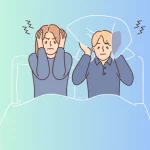Snoring is often joked about, yet anyone who lives with the dreaded sound knows that it is no laughing matter. Unfortunately, snoring can have many causes that make it hard to narrow down the issue to a specific problem. Being overweight, having sleep apnea and drinking in the evenings are just a few of the common causes of snoring. One thing is for certain, though, all it takes is a few sleepless nights or complaints from a partner and people will try just about anything to find relief. The good news is that simply making a few adjustments to your bedtime routine can help many snoring issues. Changing your sleep position is one of the cheapest places to start when it comes to stopping snoring, so give these positions a try to find one that works best for your snores.
Avoid Your Back

The majority of people who snore find that sleeping on their back makes the loudest sounds. This is because your mouth naturally opens up when you are sleeping on your back. This allows for more air to make it down your passageway where they generate vibrations that contribute to the sound. If you find yourself rolling onto your back during the night, then try sewing a sock with a tennis ball inside to the back of your pajamas. This generates just enough discomfort when you attempt to roll onto your back that your body will naturally go back on its side. Keep in mind that it may take a few nights to adjust to a new sleeping position so give it some time before you decide whether or not it works.
Tuck Something Beneath Your Chin
Dedicated back sleepers can still find some relief from snoring by placing something beneath their chin. This helps to keep your mouth closed while you are sleeping. Try a small, rolled up blanket or ball of clean socks. While this can be effective, it is common for the item to come loose from beneath your chin during the night, so be prepared to put it back in place if your snoring wakes you up again.
Try a Special Pillow

There are specially designed pillows that are made to help with snoring based upon your preferred sleep position. Typically, these pillows provide support in the right places to open up your air passages and reduce snoring. When using a special pillow, check to make sure that it cushions your head in the proper position, and avoid anything that places a strain on your neck.
Related Article: 6 Tips For Blocking Out Noise When Trying To Sleep
Elevate Your Head

This trick can be used whether you are a back, stomach or side sleeper. Simply use a pillow to prop your head up enough that it is slightly higher than the rest of your body. Alternatively, you can use special stands or books stacked beneath the legs of your bed on the head end. Either way, elevating your head allows nasal secretions to drain from your nose so that they are less likely to interfere with your breathing. Once your nose is clear, you will be more likely to keep your mouth closed as you breathe so that you do not start snoring. As with any other sleep position, use caution to ensure that you are not placing your head or neck at an odd angle that causes pain.
Prop Up Your Abdomen
Sleeping on a soft or worn mattress can sometimes cause your belly to sink lower than your chest. When this happens, your airways close up just enough that it contributes to snoring. Stomach sleepers can place a pillow underneath their abdomen to push it up, while those who sleep on their back can place a pillow just underneath the rounded curve of their spine.
Sleep On Your Side
When you sleep on your side, your mouth naturally closes. This position also eliminates the open airway vibrations that occur when you sleep on your back. Unfortunately, many people find sleeping on their side uncomfortable. If you struggle with sleeping in this position, try using a full-size body pillow to prop you up. You can also place a pillow behind your back so that you are cradled in a fetal position with no way to roll forward or backward. It is also important to note that this position is not likely to be effective for anyone who snores through both their mouth and nose.
It is always more effective to combine a change in sleeping positions with other lifestyle changes to reduce snoring. For example, avoiding alcohol before bed and sleeping in a slightly humid environment promote clearer breathing, and your sleeping partner may need to use special noise-masking ear buds until you get your snoring under control. While it may take a few tries to notice a difference, making a few changes to your sleeping position really can help stop snoring so that you and your bed partner can enjoy a good night’s sleep.
Disclaimer: All images are provided by the author.




